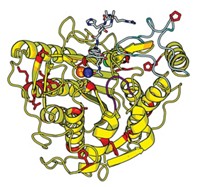Advertisement
Grab your lab coat. Let's get started
Welcome!
Welcome!
Create an account below to get 6 C&EN articles per month, receive newsletters and more - all free.
It seems this is your first time logging in online. Please enter the following information to continue.
As an ACS member you automatically get access to this site. All we need is few more details to create your reading experience.
Not you? Sign in with a different account.
Not you? Sign in with a different account.
ERROR 1
ERROR 1
ERROR 2
ERROR 2
ERROR 2
ERROR 2
ERROR 2
Password and Confirm password must match.
If you have an ACS member number, please enter it here so we can link this account to your membership. (optional)
ERROR 2
ACS values your privacy. By submitting your information, you are gaining access to C&EN and subscribing to our weekly newsletter. We use the information you provide to make your reading experience better, and we will never sell your data to third party members.
Biological Chemistry
Preventing Cell Death Halts Hearing Loss
Antioxidants suppress a protein that initiates apoptosis in inner ear neurons, stopping hearing loss in mice
by Sophie L. Rovner
November 16, 2009
| A version of this story appeared in
Volume 87, Issue 46
More than 40% of Americans older than 65 suffer from age-related hearing loss, which is associated with the death of irreplaceable spiral ganglion neurons and other cells in the inner ear. A team of researchers has now elucidated the molecular mechanism underlying the condition (Proc. Natl. Acad. Sci. USA, DOI: 10.1073/pnas.0908786106). One theory of aging posits that reactive oxygen species inflict cumulative mitochondrial damage that contributes to aging. Furthermore, accumulation of mitochondrial DNA mutations has been shown to be a factor in age-related hearing loss. In the new study, geneticist Tomas A. Prolla of the University of Wisconsin, Madison, and colleagues found that reactive oxygen species trigger expression of the protein Bak in ear cells in mice. This protein initiates apoptosis, or programmed cell death, in the cells. Feeding the mice antioxidants such as α-lipoic acid or coenzyme Q10—which suppress expression of Bak—prevented apoptosis and hearing loss. The results suggest that these compounds could be used to avert hearing loss in people.




Join the conversation
Contact the reporter
Submit a Letter to the Editor for publication
Engage with us on Twitter